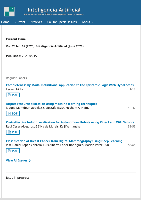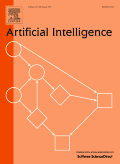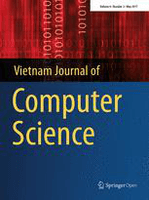
Inteligencia Artificial-Iberoamerical Journal of Artificial Intelligence
Scope & Guideline
Illuminating the Path of AI Research and Application.
Introduction
Aims and Scopes
- Artificial Intelligence Techniques and Applications:
The journal covers a wide range of AI techniques, including machine learning, deep learning, and symbolic reasoning, applied to diverse fields such as healthcare, cybersecurity, and agriculture. - Interdisciplinary Research:
It promotes interdisciplinary approaches, integrating AI with other fields like computer vision, natural language processing, and robotics, to address complex real-world problems. - Ethics and Regulation in AI:
The journal emphasizes the importance of ethical considerations and regulatory frameworks in AI development, ensuring responsible and fair use of technology. - Data-Driven Decision Making:
Research focusing on the use of AI for predictive analytics and decision support systems is a core area, highlighting the impact of data-driven approaches in various sectors. - Novel Algorithms and Methodologies:
The publication seeks to introduce novel algorithms and methods that enhance performance in AI tasks, such as classification, detection, and optimization.
Trending and Emerging
- Explainable AI (XAI):
There is a growing emphasis on developing explainable AI models that allow users to understand and trust AI decisions, particularly in sensitive areas like healthcare and finance. - AI for Healthcare:
Research focusing on AI applications in healthcare, such as disease diagnosis and patient monitoring, is trending, reflecting the urgent need for innovative solutions in this sector. - Cybersecurity and AI:
The intersection of AI and cybersecurity is gaining traction, with studies on using machine learning for threat detection and risk assessment becoming increasingly relevant. - AI Ethics and Governance:
Emerging discussions around the ethics of AI, including fairness, accountability, and transparency, are becoming central to the research agenda, particularly in light of regulatory frameworks like the EU AI Act. - Transfer Learning and Domain Adaptation:
The use of transfer learning techniques is on the rise, allowing models to adapt knowledge from one domain to another, which is particularly useful in scenarios with limited data.
Declining or Waning
- Traditional Rule-Based Systems:
Research on traditional rule-based AI systems has seen a decline as the field moves towards more data-driven approaches, particularly deep learning and machine learning. - Basic Statistical Techniques:
There is a noticeable reduction in the use of basic statistical methods for AI applications, as researchers increasingly adopt advanced machine learning techniques that offer more robust solutions. - General AI Frameworks:
Interest in general AI frameworks without specific applications is waning, as publications are focusing more on specialized applications that demonstrate clear real-world benefits. - Single-Domain Studies:
Research limited to single-domain applications is decreasing, with a trend towards multi-domain and interdisciplinary studies that address broader challenges. - Hardware-Centric AI Approaches:
The focus on hardware-specific solutions is declining as software and algorithmic advancements take precedence in driving AI innovations.
Similar Journals

Journal of Business Analytics
Transforming data into strategic business solutions.The Journal of Business Analytics, published by Taylor & Francis Ltd, is an esteemed platform dedicated to advancing the field of business analytics through rigorous research and innovative methodologies. Since its inception in 2018, this journal has provided a vital resource for researchers, practitioners, and students interested in the intersection of data science, management, and decision-making processes. With an impact factor reflective of its commitment to high-quality research, the journal holds notable rankings across multiple disciplines, including Q2 in Industrial and Manufacturing Engineering and Management Information Systems, as well as Q3 in Artificial Intelligence and Management Science and Operations Research. The journal's broad scope encompasses pivotal themes such as predictive analytics, decision support systems, and statistical methodologies, making it an essential resource for a diverse audience. The Journal of Business Analytics continues to foster collaboration and knowledge exchange within the academic community, positioning itself as a cornerstone for those seeking to navigate the complex landscapes of business and technology.

Intelligent Medicine
Pioneering the future of intelligent healthcare solutions.Intelligent Medicine, published by Elsevier, is a leading open-access journal dedicated to advancing the fields of Artificial Intelligence, Biomedical Engineering, Health Informatics, and related areas within Medicine. Since its inception in 2021, it has quickly established itself among the top tier of academic publications, holding a commendable Q2 ranking in several categories, including a rank of #51 in Health Informatics and #104 in Medicine (Miscellaneous) as of 2023. The journal aims to disseminate innovative research that harnesses AI technologies to improve healthcare outcomes, bridging the gap between cutting-edge technology and medical practice. With its open-access model, Intelligent Medicine ensures broad dissemination of research findings, facilitating collaboration and knowledge sharing among researchers, practitioners, and students globally. Located in Amsterdam, Netherlands, this journal plays a pivotal role in shaping the future of intelligent healthcare solutions, inviting submissions that push the boundaries of conventional medicine through creative and impactful research.

ARTIFICIAL INTELLIGENCE
Bridging Theory and Practice in Artificial IntelligenceArtificial Intelligence, published by Elsevier, is a premier scholarly journal that has been at the forefront of research in the fields of Artificial Intelligence, Linguistics, and Language Studies since its inception in 1970. With a prestigious ranking in the Q1 quartile for both its primary categories, the journal is recognized for its significant contributions to the understanding and advancement of AI technologies and their applications in natural language processing. It is highly regarded in academic circles, reflected in its exceptional Scopus Rankings—placing it in the 99th percentile in both Arts and Humanities, and Social Sciences, as well as a respectable 85th percentile in Computer Science, specifically within Artificial Intelligence. Although Open Access options are not currently available, the journal provides a vital platform for researchers, professionals, and students to disseminate groundbreaking ideas, fostering innovation and collaboration in this rapidly evolving field. The journal's comprehensive scope aims to bridge theoretical advancements with practical applications, making it an invaluable resource for those seeking to explore the intersection of technology and linguistics.

INTERNATIONAL JOURNAL OF APPROXIMATE REASONING
Leading the Charge in High-Impact ResearchThe INTERNATIONAL JOURNAL OF APPROXIMATE REASONING, published by Elsevier Science Inc, stands as a pivotal resource in the domains of applied mathematics and artificial intelligence. Since its inception in 1987, the journal has evolved into a leader in its field, boasting an impressive impact factor and ranking within the top quartile for applied mathematics (Q1) and high standings in artificial intelligence and software categories according to the 2023 Scopus rankings. As researchers, professionals, and students delve into complex issues surrounding reasoning under uncertainty, this journal provides invaluable insights and cutting-edge research. In addition to its rich content, the journal's commitment to advancing knowledge in theoretical computer science further enhances its significance in fostering academic growth. While the journal does not currently offer open access, its rigorous peer-review process ensures that only high-quality, impactful studies are published, solidifying its role as an essential source for academics striving to remain at the forefront of their fields.

Vietnam Journal of Computer Science
Pioneering research that drives computational excellence.Vietnam Journal of Computer Science, published by World Scientific Publishing Co Pte Ltd, serves as a prominent platform for researchers and professionals in the rapidly evolving field of computer science. Launched as an Open Access journal in 2013, it aims to disseminate high-quality research across various subfields, including Artificial Intelligence, Computational Theory and Mathematics, Computer Vision, and Information Systems. With its ISSN 2196-8888 and E-ISSN 2196-8896, the journal provides valuable insights and contributes to the growing body of knowledge in computer science, particularly in Southeast Asia. Despite its relatively recent establishment, the journal has achieved significant rankings, including Q3 status in multiple categories and notable visibility in Scopus metrics, evidencing its commitment to fostering innovative research. This journal is essential for those looking to stay at the forefront of computational advancements and applications, particularly in Vietnam and beyond, facilitating an engaging dialogue among scholars and industry professionals.

Machine Intelligence Research
Driving Knowledge Forward in Machine IntelligenceMachine Intelligence Research is a premier academic journal published by SPRINGERNATURE, dedicated to advancing knowledge in the rapidly evolving fields of Artificial Intelligence, Applied Mathematics, and more. With its ISSN 2731-538X and E-ISSN 2731-5398, the journal is recognized for its impact, holding a distinguished position in various Q1 categories for 2023, including Computer Vision and Pattern Recognition and Control and Systems Engineering. Operating under an Open Access model, it ensures that groundbreaking research from China and around the world remains accessible to a global audience, promoting collaboration and innovation. As a beacon for researchers, professionals, and students, Machine Intelligence Research aims to disseminate high-quality research findings, innovative methodologies, and influential theories, thereby shaping the future landscapes of science and technology.

Evolutionary Intelligence
Charting New Territories in AI and Cognitive ScienceEvolutionary Intelligence is a prestigious journal published by Springer Heidelberg, dedicated to the interdisciplinary study of Artificial Intelligence, Cognitive Neuroscience, Computer Vision, and Mathematics. With its ISSN 1864-5909 and E-ISSN 1864-5917, the journal has established a significant presence in the academic community since its inception in 2008. Spanning a diverse range of topics relevant to both theoretical and empirical research, it has achieved impressive rankings, including Q3 in Artificial Intelligence and Cognitive Neuroscience, and Q2 in Computer Vision and Pattern Recognition as of 2023. With a strong Scopus ranking that places it in the top quartiles of its field, Evolutionary Intelligence serves as an essential platform for scholars and practitioners seeking to advance knowledge and foster innovation in these dynamic fields. Researchers, professionals, and students alike will find invaluable insights and cutting-edge findings that challenge existing paradigms and inspire future explorations in intelligence-related studies.

International Arab Journal of Information Technology
Elevating Arab Research in Global IT DiscoursesWelcome to the International Arab Journal of Information Technology, a prestigious publication under the aegis of ZARKA PRIVATE UNIVERSITY in Jordan, dedicated to advancing the field of Information Technology. First established in 2008, this journal has made significant strides in disseminating high-quality research, achieving an impressive Q2 ranking in Computer Science (miscellaneous) and securing a notable 57th percentile position in the Scopus rankings. With a comprehensive scope encompassing various sub-disciplines of computer science, the journal is committed to promoting scholarly dialogue and innovation among researchers, professionals, and students. While currently operating as a subscription-only journal, it remains a vital resource for the academic community seeking to explore the latest trends and advancements in technology. The International Arab Journal of Information Technology is not only a platform for original research but also a vibrant hub for ideas that shape the technological landscape of the Arab region and beyond.

ADCAIJ-Advances in Distributed Computing and Artificial Intelligence Journal
Catalyzing Collaboration in Computing and AIADCAIJ - Advances in Distributed Computing and Artificial Intelligence Journal, published by EDICIONES UNIV SALAMANCA, is an esteemed academic journal dedicated to the rapidly evolving fields of artificial intelligence, computer networks, and distributed computing. With its commitment to Open Access since 2012, the journal ensures that cutting-edge research is accessible to a global audience, fostering collaboration and innovation in the scientific community. Based in Spain, ADCAIJ is making significant strides with its current status in the Q3 quartile across various domains, including Artificial Intelligence and Information Systems. Despite its emerging status, it ranks with great potential, providing a platform for researchers to share their findings and contribute to advancements in these critical areas. The journal not only facilitates knowledge dissemination but also encourages interdisciplinary approaches that are crucial for tackling contemporary challenges. As it continues to expand its influence from 2019 through 2024, ADCAIJ is poised to play a key role in shaping future research trajectories and technological applications in its field.

International Journal of Machine Learning and Cybernetics
Advancing the Frontiers of AI and CyberneticsInternational Journal of Machine Learning and Cybernetics, published by SPRINGER HEIDELBERG, serves as a pivotal platform for scholars and practitioners in the fields of Artificial Intelligence, Computer Vision, and Software Engineering. With its impressive Q2 and Q1 rankings in esteemed categories such as Artificial Intelligence and Computer Vision and Pattern Recognition, this journal boasts a commendable reputation within the academic community, further solidified by its Scopus rankings that place it in the top percentiles of its category. This journal covers critical advancements and research trends spanning the years from 2010 to 2024, facilitating knowledge exchange that drives innovation in machine learning and cybernetics. Although it operates under a subscription model, it remains accessible for extensive readership, comprising researchers, professionals, and students eager to advance their understanding in this dynamic and rapidly evolving discipline. Stay at the forefront of technology by engaging with the latest findings and methodologies published in this influential journal, identified by its ISSN 1868-8071 and E-ISSN 1868-808X.